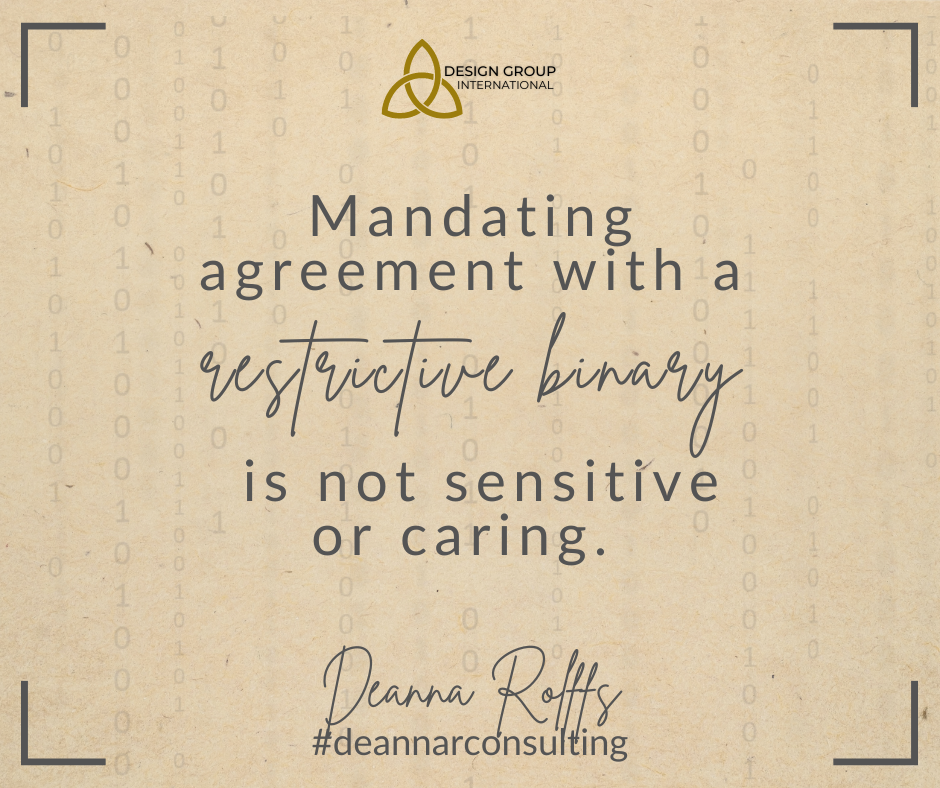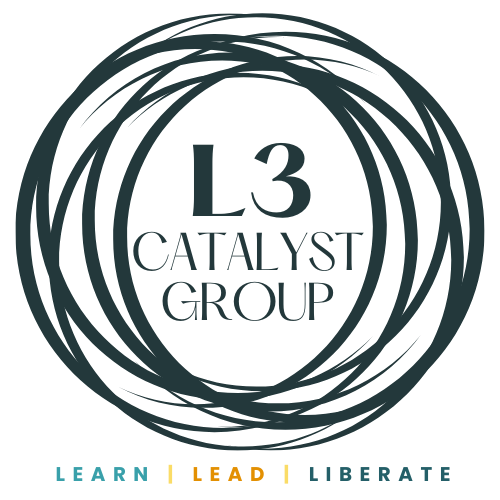Leadership + the Binary
Illuminating White Supremacy Culture Part 6
I interned at the United States Export Assistance Center during graduate school. The director asked us interns to solve a complex problem. The other intern was convinced that she knew how to solve the problem. I asked her if we could meet to create a solution together.
The other intern wouldn’t talk to me for weeks because she perceived that I disrespected her solution.
We hadn’t even unpacked the problem together.
She thought she was right, and wouldn't entertain a conversation.
My fellow intern isn’t alone. I've done the same thing when I was convinced I was right.
We live in a world of binaries, convinced we don’t have time for complexity.
People are presumed to be male or female.
Your answer was right or wrong.
That colleague’s solution is good or bad.
That character was a villain or hero.
That group of people are friends or enemies.
Humans often polarize ourselves into binaries. We love being a part of the in-group. Fear of the "other" is not new, but it can denigrate civil society and dehumanize people. Ultimately, it’s separating us from each other.
Either/Or & the Binary is a Characteristic of White Supremacy Culture. In this article, we will unpack characteristics of and antidotes to Either/Or & the Binary thinking to be able to see it, consider its impact, and expand thinking beyond the Binary.
Either/Or & the Binary “explores our cultural assumption that we can and should reduce the complexity of life and the nuances of our relationships with each other and all living things into either/or, yes or no, right or wrong in ways that reinforce toxic power.” (Okun, White Supremacy Culture - Still Here, 2021)
The White Supremacy Culture characteristic of Either/Or & the Binary shows up as:
- Positioning or presenting options or issues as either/or — good/bad, right/wrong, with us/against us
- Holding little or no sense of the possibilities of both/and
- Trying to simplify complex things. For example, believing that poverty is simply the result of a lack of education (Okun, 2021)
The Either/Or & the Binary is connected to other White Supremacy Culture characteristics, including an increased sense of urgency, fear of open conflict, and perfectionism:
- Conflict and an increased sense of urgency, as people feel they have to make decisions to do either this or that, with no time or encouragement to consider alternatives, particularly those which may require more time or resources
- Closely linked to perfectionism because binary thinking makes it difficult to learn from mistakes or accommodate conflict (Okun, 2021)
Either/or & the Binary is used as:
- A strategy used by those with a clear agenda or goal to push those who are still thinking or reflecting on choosing between ‘a’ or ‘b’ without acknowledging a need for time and creativity to come up with more options
- A strategy used to pit oppressions against each other rather than to recognize how racism and classism intersect, how both intersect with heterosexism, ageism, and other categories of oppression (Okun, 2021)
 Do you see yourself, your colleagues, friends, or your family using either/or and binary thinking? What is the result?
Do you see yourself, your colleagues, friends, or your family using either/or and binary thinking? What is the result?
The gender binary is a very salient example of binary thinking.
The ACLU is currently tracking 373 anti-LBTQ+ bills, aimed particularly at transgender and nonbinary people.
Why do you think that is? Who are you hearing is at risk of harm?
My hope is that this post increases our ability to notice and critique the swift control wielded when we perceive threats to a socially-constructed and preciously held binary such as gender.
Examples are everywhere. Recently, the board of a private school system passed a resolution taking a heteronormative stance on marriage and a firm stance supporting a gender binary:
We “believe(s) that before the fall into sin, God created us male and female, and there was no gender confusion.”
In this statement, they also mandate that staff promise to align their views and show sensitivity and care to students.

Mandating agreement with a restrictive binary is not sensitive or caring.
Freedom from the gender binary is joy and liberation. For some of us, it is literally life-saving.
Gender has never been a strict binary. Genderqueer and Non-Gender Conforming people are not new.
Being gender non-binary is not “confusion.” (Links below for more on this.)
When we think in a binary, we can get stuck judging complexity as confusion or presume anything outside the binary is wrong.
What can we do about it when we notice Either/Or & the Binary thinking?
thinking?
Okun and co-authors share antidotes to Either/Or & the Binary, including suggestions for how to show up in more connecting and healing ways:
- Notice when you or others use ‘either/or’ language and make time to come up with more than two alternatives
- Notice when you or others are simplifying complex issues, particularly when the stakes seem high, or an urgent decision needs to be made
- When urgency arises, and binary thinking emerges, slow down and encourage people to take a pause, a breath, restate the goal, and dive deeper into alternatives
- When you or others are faced with an urgent decision, take a break and offer some breathing room to think creatively and allow intuitive wisdom to arise
- Avoid making decisions under extreme pressure and work to distinguish what is actual pressure and what is a pressure that you or others are creating
- Avoid trying to assign a single cause to a problem or a challenge; acknowledge how oppressions intersect and reinforce each other, as well as how oppression can operate at the interpersonal, institutional, and cultural levels (Okun, 2021)
How do you think the role of fear interacts with pushback against binary thinking?
What antidote are you willing to try?
I’d love to hear what you are observing and learning about disrupting either/or and binary thinking.
Fellow leaders and learners, I wish you courage and joy on the journey.


What I'm Reading/Watching:
-
-
- The Good Bad and Ugly of Binary Thinking via Stanford Law School
- Nature and sex redefined – we have never been binary via The Guardian
- Mapping Attacks on LGBTQ Rights in U.S. State Legislatures
-

Questions for Consideration Regarding This Topic:
-
-
- Do you see yourself, your colleagues, or your friends using either/or and binary thinking? What is the result of that pattern?
- What antidote are you willing to try?
- What binaries are you invested in as right/wrong?
-

Related Leadership & Learning Letter Topics:
Tags:
White Supremacy Culture’s Characteristics, Binary, EitherOr, leadership, anti-oppression, Antidotes
May 15, 2023




Comments